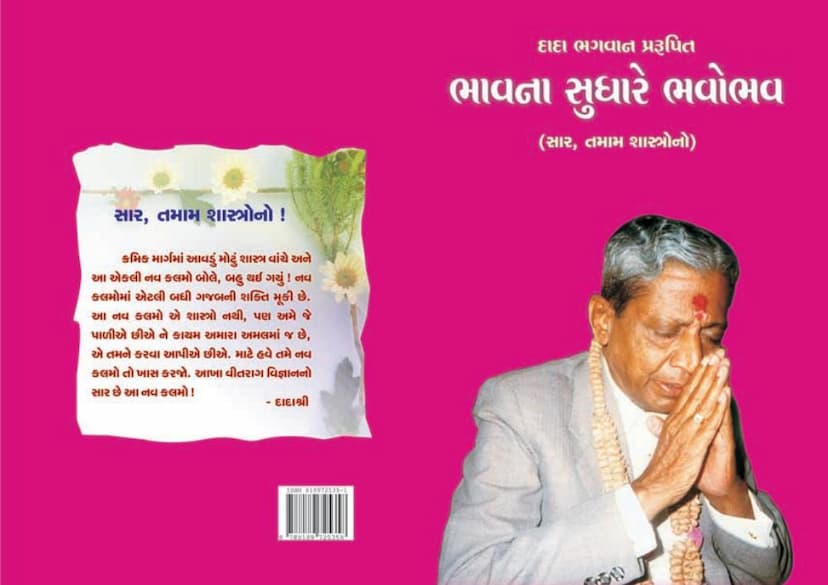Bhavna Sudhare Bhavobhav
Added to library: September 1, 2025

Summary
This text, "Bhavna Sudhare Bhavobhav (The Essence of All Scriptures)" by Dada Bhagwan, presents a profound set of nine "kalams" (phrases or principles) that encapsulate the core teachings for spiritual progress and betterment across lifetimes. Dada Bhagwan emphasizes that these nine kalams are not mere scriptures to be read, but practical principles that he himself lived by and now offers as a powerful tool for liberation.
Core Message and Purpose:
The central theme is that true spiritual advancement and the resolution of all worldly problems, across countless lifetimes, stem from refining one's inner "bhavna" (inner feeling, intent, or attitude). The nine kalams are presented as the essence of all scriptures, offering a direct and scientifically grounded solution to the common human struggle of knowing what to do but being unable to implement it.
The Nine Kalams (Principles) and Their Essence:
The book details and explains each of the nine kalams, which are essentially prayers for specific spiritual strengths. The essence of each is as follows:
- To not hurt the ego of any living being: This emphasizes the importance of speaking, acting, and thinking in a way that respects the self-esteem and ego of others. It requests the power to speak, act, and think with "syadvad" (a nuanced, multi-faceted perspective) so that no one's ego is hurt.
- To not hurt the principles of any religion: This promotes respect and tolerance for all religious beliefs and practices, asking for the ability to speak, act, and think with "syadvad" regarding religious matters.
- To not slander, commit offenses, or show disrespect towards any embodied being, preacher, monk, nun, or spiritual leader: This calls for maintaining respect and avoiding negative speech or actions towards spiritual figures and teachers, acknowledging their role in the path.
- To not develop dislike or contempt for any living being: This emphasizes the need for universal love and acceptance, requesting the strength to overcome feelings of aversion or disdain towards anyone.
- To not speak harsh or thorny language, and to speak with soft and gentle language: This focuses on the power of speech, asking for the ability to communicate kindly and to respond to harshness with gentleness.
- To not harbor desires or engage in actions related to sensual passions towards any living being, regardless of gender, and to remain ever devoid of lustful desires: This highlights the importance of celibacy and self-control in matters of sexuality, seeking the strength to remain pure and untouched by desires.
- To not be attached to any particular taste and to eat balanced food: This encourages equanimity in food choices, advising against being overly attached to specific flavors and promoting a balanced diet.
- To not slander, commit offenses, or show disrespect towards any embodied being, whether directly or indirectly, alive or deceased: This expands the principle of respect to include those who are no longer living, urging against any form of negative speech or action towards them.
- To become an instrument for the welfare of the world: This expresses a selfless desire to contribute to the well-being of all beings, asking for the power to be a medium for universal benefit.
The "Akram Marg" (Unfolding Path) and the Power of Seeking:
Dada Bhagwan explains that these kalams are to be requested from "Dada Bhagwan" (the Self within). He stresses that one does not need to force themselves to implement these principles; rather, by sincerely asking for the "shakti" (spiritual power) to do so, the ability will naturally develop. This is the essence of the "Akram Marg" – a direct, shortcut path to self-realization, unlike the gradual, step-by-step "Kram Marg."
Key Concepts and Teachings:
- Cause and Effect: Dada Bhagwan explains that behavior is an effect, and inner feelings (bhava) are the cause. By changing the cause (bhava), the effect (behavior) will automatically change.
- Syadvad: This principle is repeatedly emphasized, signifying the importance of understanding and speaking from multiple perspectives without causing offense or judgment.
- Pratikraman (Self-Repentance): When mistakes happen despite the intention, sincere repentance (pratikraman) is advised, followed by requesting the strength through the kalams.
- The "Dada Bhagwan" Within: The prayers are directed to the Divine presence within oneself, referred to as "Dada Bhagwan" or "Shuddhatma" (Pure Soul).
- The Power of Seeking: The core practice is to continuously ask for the necessary spiritual strength from the Divine within. This act of asking itself is a powerful practice that brings about the desired change.
- Not Doing, but Seeking: The emphasis is on "asking for power" rather than "trying to do." By seeking, the ego is kept at bay, and the divine power works through the individual.
- Inner Purification: The kalams are presented as a means to purify the inner self, release karmic accounts (runanubandh), and ultimately achieve liberation.
Practical Application:
The book encourages reciting these nine kalams daily, or whenever possible. The act of reading and internally reciting them is considered a form of seeking the necessary spiritual strength. The text assures that by consistently making these requests, the internal disposition will gradually align with the principles, leading to a transformation in behavior and ultimately, liberation.
In essence, "Bhavna Sudhare Bhavobhav" offers a practical, scientifically grounded path to spiritual evolution through the power of sincere intention and the divine support that comes from asking for spiritual strength, as taught by Dada Bhagwan. It's a guide for transforming one's inner state to achieve lasting peace and freedom across all lifetimes.